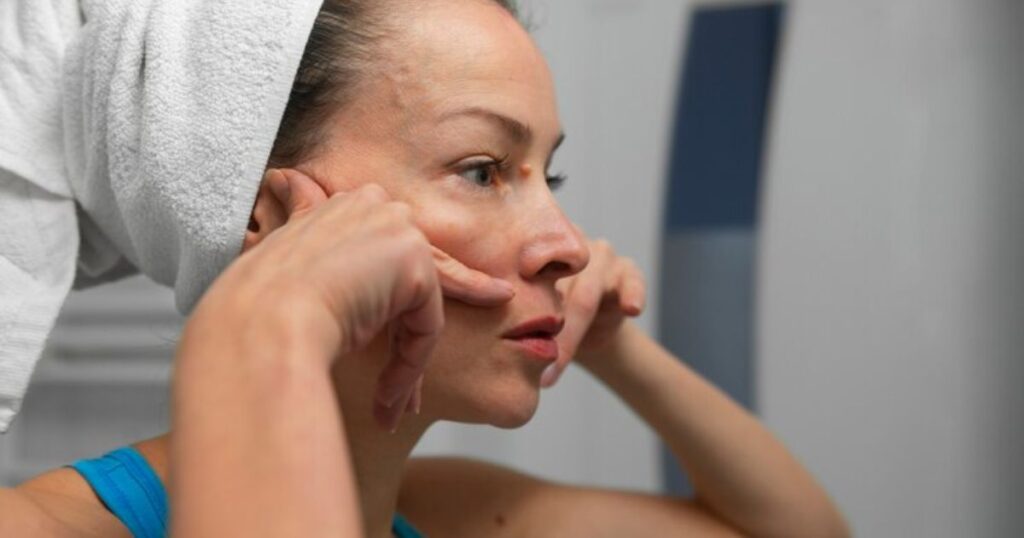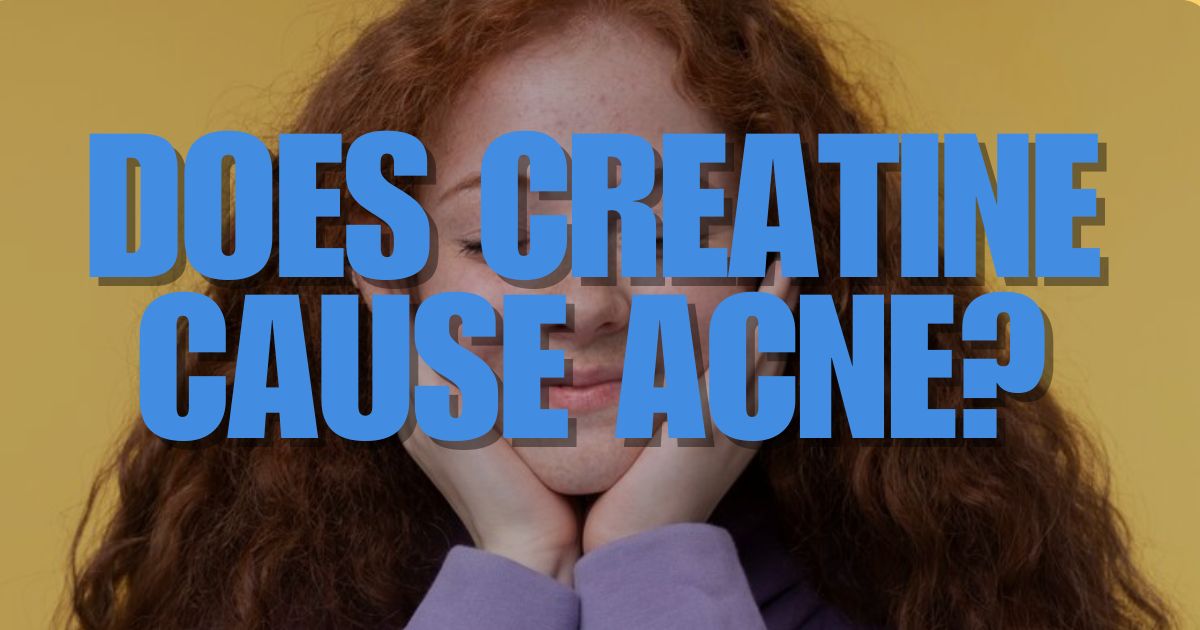Creatine is a widely used supplement known for boosting energy and improving workout performance. However, many people wonder, does creatine cause acne? This concern arises because skin health is important, and any potential side effects of supplements can be worrying. Let’s explore whether creatine is linked to acne and what experts have to say about it.
How Creatine Works in the Body?
Creatine is a naturally occurring compound in the body, primarily stored in muscles, and plays a crucial role in energy production.
Its primary function is to regenerate adenosine triphosphate (ATP), the energy currency of cells, allowing muscles to sustain high-power output for longer periods.
Creatine indirectly promotes muscle growth and strength over time, enabling longer and more intense workouts. It also supports cognitive function and neuroprotection by improving energy availability in brain cells.
Creatine is synthesized in the liver, kidneys, and pancreas, and can be obtained through dietary sources or supplementation.

How To Use Creatine Safely?
Creatine is a natural compound found in muscles and certain foods, often used as a supplement to enhance physical performance and muscle growth. It helps replenish ATP, the primary energy source for muscles during high-intensity activities.
Creatine Monohydrate is the most researched and widely recommended form, with 20 grams per day for the loading phase and 3-5 grams per day for the maintenance phase. Drinking plenty of water is crucial for proper absorption.
Creatine can be taken at any time of the day, but it may be most effective post-workout with a carbohydrate or protein source. It should be combined with a balanced diet to support muscle growth and recovery. Consult a doctor if you have health conditions, use quality products, and do not exceed the recommended dosage.
Does Creatine Cause Acne?
Creatine itself doesn’t directly cause acne, but there are some factors related to its use that could potentially cause acne in some people. Hormone activity, water retention, dietary changes, sweating from exercise, and individual sensitivity can cause acne.
Higher levels of dihydrotestosterone (DHT) can stimulate sebaceous glands in the skin, potentially leading to clogged pores and acne. However, this effect varies among people, with some experiencing mild increases in DHT and others not. Regular face cleaning is essential to reduce the risk.

Can Creatine Affect the Skin in Any Other Way?
1. Water Retention in Facial Tissues
Creatine-induced water retention in muscles may also affect facial tissues in some individuals. This can lead to:
- Puffiness or Swelling: Particularly around the eyes or cheeks, creating a bloated appearance.
- Temporary Changes in Facial Contours: Excess water retention might make the skin appear stretched or swollen, which can be cosmetically unappealing.
2. Worsening of Eczema or Psoriasis
For those who are vulnerable, using creatine supplements may make skin disorders like psoriasis or eczema worse. This is an indirect result of water redistribution, dehydration, or possible alterations in immune system function rather than a direct effect of creatine.
- Eczema Flare-Ups: Dry skin from dehydration can trigger or worsen eczema symptoms, including redness, itching, and scaling.
- Psoriasis Aggravation: Any imbalance in skin hydration or immune responses may lead to increased plaque formation in psoriasis patients.
3. Rash or Allergic Reactions
Although rare, some users may experience allergic reactions or skin rashes after consuming creatine. This may be due to:
- Impurities in the Supplement: Some creatine products contain fillers, artificial flavors, or other additives that can irritate the skin or cause allergic reactions.
- Individual Sensitivity: People with sensitive skin may develop mild irritation, redness, or hives.
4. Increased Sebum Production (Not Leading to Acne)
While creatine itself does not directly cause acne, some individuals may notice increased sebum production. Excess sebum can lead to:
- Greasy or Shiny Skin: This can be uncomfortable or difficult to manage, especially for those with oily skin types.
- Clogged Pores (Without Acne): Even if acne does not develop, clogged pores can create uneven skin texture or blackheads.
5. Potential Oxidative Stress
Some studies suggest that intense exercise combined with creatine supplementation may increase oxidative stress in certain individuals. Oxidative stress can damage skin cells and lead to:
- Premature Aging: Fine lines, wrinkles, and reduced elasticity.
- Dull Skin: A lackluster appearance due to damaged skin cells and reduced collagen production.

Can Creatine Cause Headaches?
Creatine can cause headaches due to dehydration, electrolyte imbalance, overuse or excessive dosage, caffeine interaction, pre-existing conditions, and individual sensitivity. To avoid headaches, drink plenty of water, monitor creatine dosage, and take breaks from caffeine.
If headaches persist or are severe, consider discontinuing creatine and consulting a healthcare professional. Staying hydrated and using the proper dosage can minimize the risk.
More to Read: Can Creatine Help You Lose Weight?
Final Thoughts
There is no strong evidence that creatine directly causes acne. Most cases of acne are influenced by hormones, diet, or genetics, not creatine. However, if you notice changes in your skin after starting creatine, it could be due to dehydration or other factors related to your lifestyle.
Staying hydrated, maintaining a balanced diet, and keeping your skin clean can help prevent acne while using creatine safely. Always listen to your body and consult a doctor if you have concerns.
People Also Ask
1. Does creatine cause acne?
No, there is no direct scientific evidence to suggest that creatine causes acne. Creatine is a supplement that enhances muscle performance and does not affect the skin directly. However, other factors associated with creatine use, like increased exercise intensity, may contribute to acne outbreaks by causing more sweating and bacteria build up on the skin.
2. Why do I get acne when I take creatine?
Other possible causes of acne when using creatine include dehydration, dietary changes, or increased perspiration from more strenuous exercise. These elements may contribute to breakouts and congested pores. Acne is not directly caused by creatine.
3. Can creatine cause hormonal changes that lead to acne?
According to certain studies, creatine may marginally raise dihydrotestosterone (DHT) levels, a hormone that can aggravate acne by promoting the production of sebum. These alterations are usually slight, though, and are not likely to result in severe acne outbreaks.
4. Can creatine cause dehydration that leads to acne?
Indeed, because creatine pulls water into your muscles, it might cause dehydration. Acne may become more likely as a result of dehydrated skin trying to compensate by becoming greasy. It’s crucial to drink enough of water when taking creatine to prevent this.
5. How can I prevent acne while using creatine?
Stay hydrated, follow a decent skincare regimen, and refrain from perspiring excessively without washing your face afterwards to prevent acne when taking creatine. Clear skin can be maintained by showering after exercise and washing your face with a mild, oil-free cleanser. Additionally, cutting less on sweets and coffee may help reduce breakouts.









Leave a Reply